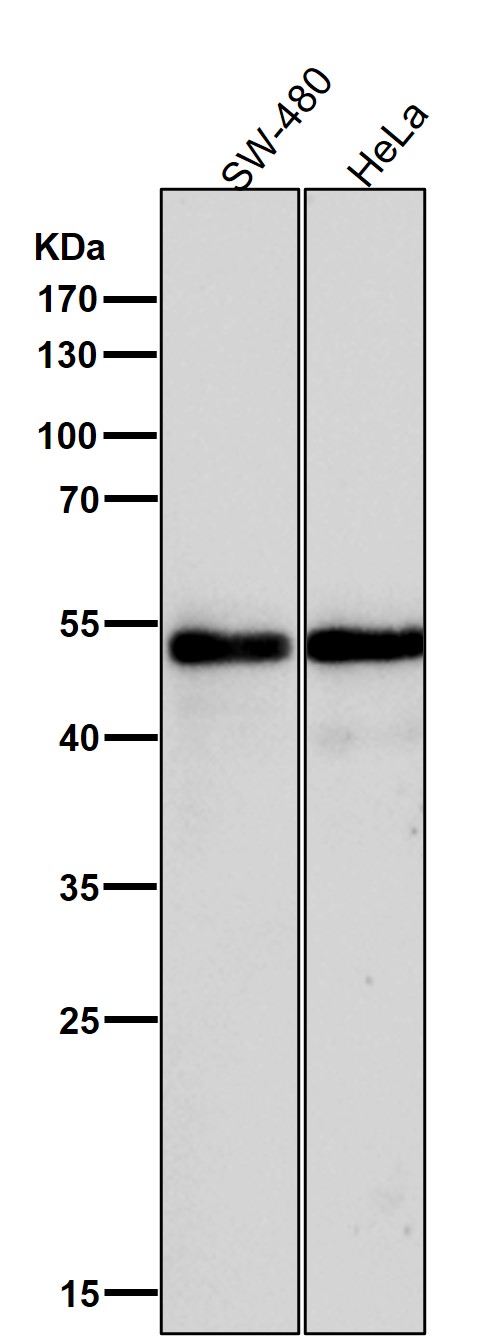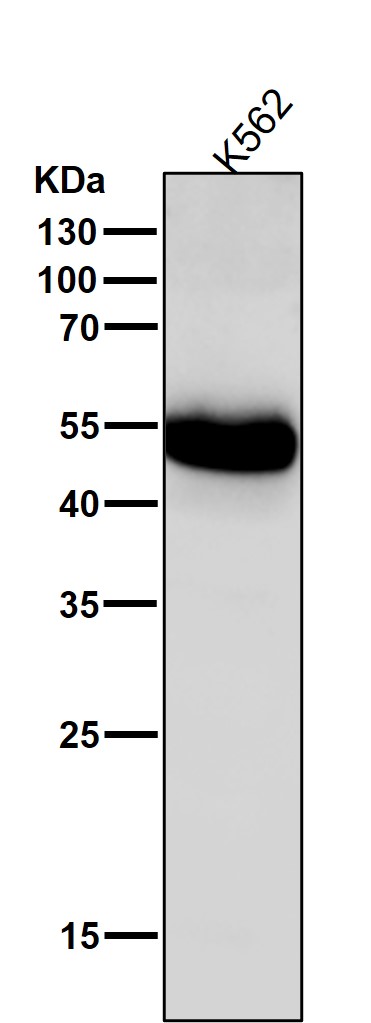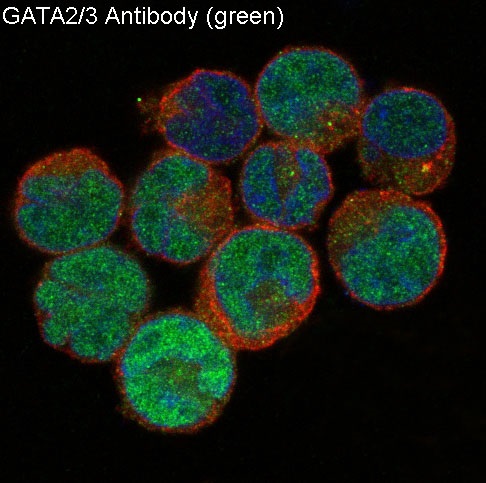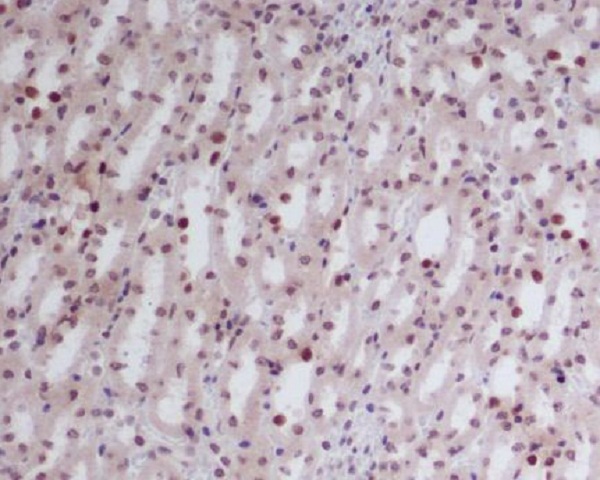




| WB | 咨询技术 | Human,Mouse,Rat |
| IF | 1/20-1/50 | Human,Mouse,Rat |
| IHC | IHC:1/100-1/200;IHF:1/50-1/200 | Human,Mouse,Rat |
| ICC | 1/50-1/200 | Human,Mouse,Rat |
| FCM | 咨询技术 | Human,Mouse,Rat |
| Elisa | 咨询技术 | Human,Mouse,Rat |
| Aliases | DCML;GATA binding protein 2;GATA binding protein 3;HDR;HDRS;IMD21;MONOMAC;NFE1B;GATA2/3 |
| WB Predicted band size | Calculated MW: 51,48 kDa ; Observed MW: 51 kDa |
| Host/Isotype | Rabbit IgG |
| Antibody Type | Primary antibody |
| Storage | Store at 4°C short term. Aliquot and store at -20°C long term. Avoid freeze/thaw cycles. |
| Species Reactivity | Human,Mouse,Rat |
| Immunogen | A synthesized peptide derived from human GATA2 |
| Formulation | Purified antibody in PBS with 0.05% sodium azide,0.05% BSA and 50% glycerol. |
+ +
以下是关于GATA2/3抗体的3篇代表性文献及其摘要内容:
1. **"GATA-2 is required for the development of the erythroid and myeloid lineages"**
- **作者**: Tsai, F.Y., Keller, G., Kuo, F.C., et al.
- **摘要**: 该研究通过基因敲除和小鼠模型,结合GATA2抗体的免疫染色,揭示了GATA2在造血干细胞分化为红细胞和髓系细胞中的关键作用,证明其缺失导致造血系统发育异常。
2. **"GATA2 regulates mast cell identity and responsiveness to antigenic stimulation"**
- **作者**: Hosoya-Ohmura, S., Lin, Y.W., et al.
- **摘要**: 利用GATA2抗体进行染色质免疫沉淀(ChIP)和流式细胞分析,研究发现GATA2通过调控肥大细胞特异性基因表达,影响其抗原响应能力及炎症反应。
3. **"GATA3 controls the expression of CD4+ T cell lineage-specific genes in developing thymocytes"**
- **作者**: Hendriks, R.W., et al.
- **摘要**: 通过GATA3抗体检测胸腺细胞中的蛋白表达,发现GATA3直接调控CD4+ T细胞分化相关基因,其功能缺陷导致T细胞发育停滞和免疫失调。
4. **"GATA3 expression in breast cancer: a potential therapeutic target?"**
- **作者**: Kaufman, C.K., et al.
- **摘要**: 研究通过免疫组化(IHC)结合GATA3抗体,分析乳腺癌组织中GATA3的表达水平,提示其作为预后标志物和潜在治疗靶点的可能性。
这些文献涵盖了GATA2/3在造血、免疫及癌症中的功能研究,并均涉及抗体的实验应用(如染色、ChIP、流式分析等)。
**Background of GATA2/3 Antibodies**
GATA2 and GATA3 are transcription factors belonging to the GATA family, characterized by conserved zinc finger DNA-binding domains that recognize the consensus sequence (A/T)GATA(A/G). These proteins play pivotal roles in cellular differentiation, proliferation, and tissue development. **GATA2** is essential for hematopoiesis, endothelial cell function, and the maintenance of hematopoietic stem cells. It is also implicated in immune regulation and organogenesis. Dysregulation of GATA2 is linked to disorders such as immunodeficiency, myelodysplastic syndromes, and leukemia. **GATA3** is critical for T-cell development, Th2 cell differentiation, and mammary gland morphogenesis. It drives the expression of cytokines like IL-4. IL-5. and IL-13. influencing allergic responses and immune homeostasis. GATA3 aberrations are associated with breast cancer, hypoparathyroidism-deafness-renal dysplasia syndrome, and autoimmune diseases.
Antibodies targeting GATA2/3 are widely used in research and diagnostics to study their expression patterns, localization, and functional roles. In immunohistochemistry (IHC), these antibodies help identify cell types (e.g., Th2 cells or luminal breast cancer cells) and assess disease progression. Western blotting and ChIP-seq utilize them to analyze protein levels and DNA-binding activity. Commercially available antibodies vary in specificity, with epitopes often targeting N-terminal or C-terminal regions. Validation via knockout models or siRNA is crucial due to potential cross-reactivity with other GATA members. Clinically, GATA3 antibodies serve as biomarkers in cancer diagnostics (e.g., triple-negative breast cancer) and therapeutic targeting research. Their utility underscores the importance of GATA2/3 in both normal physiology and pathology.
×